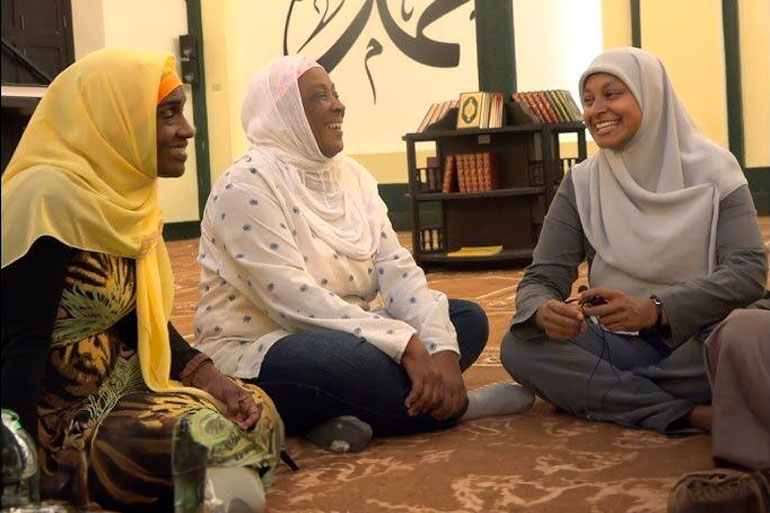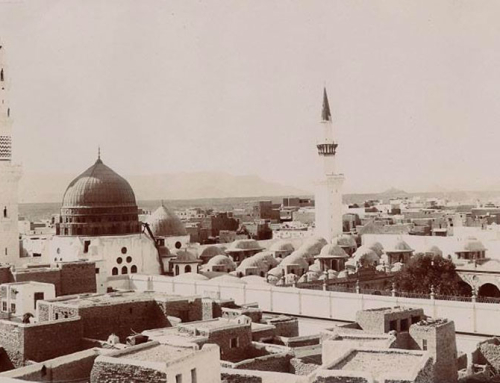Abdessalam Yassine
August 17, 2023
The Degree Which Men Hold Over Women
Although the advocates of women’s so-called emancipation were correct in that the conditions of the Muslim woman were wretched, their intentions were not sound. Had they judged the injustices done to women according to the Qur›ān and the Sunna, we would have welcomed their initiative. Had they assigned the matter of ijtihād to those with the requisite qualifications – the most important of which are authentic knowledge and God-wariness – we would have congratulated their effort. But they judge Islam according to Western fashions of liberty and practice ijtihād in the name of progress so as to “rescue” Muslims from the “darkness” of submitting to God and His Messenger.
Certainly the Muslim woman was – and still is – the victim of injustice. She has suffered from illiteracy and has been confined to her household. Nowadays, she is caught in the crossfire between the Westernizing movement and the fall-out of her umma’s decline. The claims of those who advocate “emancipation” are true to a great extent: the enslavement of urban women, the maltreatment of rural women, illiteracy, ignorance, paltry wages, the ruthless exploitation of young girls in factories, abusive polygamy, unjust divorce laws, forced marriage, deprivation of their just share of inheritance, among many other items.
Why are we so inclined to forget about these traditional iniquities while we vehemently denounce the more recent problems of licentiousness, apostasy, and imitation of European women?
These current issues only came about because traditional Islamic jurisprudence and traditional Islamic rule did not solve the older
70
issues. The wrongs suffered by Muslim women must be examined by Islamists(1) inseparably from their criticism of immodesty and Westernization. They must work out practical ways of addressing unjust customs in addition to addressing the deforming process of modernization, since this deformation could never have happened had the injustice of customs not been there.
If we do not seek to devise practical solutions, the increasing injustice – disguised under the precedent of a “realist” jurisprudence that, yielding to the status quo, is stringent and neglectful of women’s needs – will inevitably drive Muslim women to join internationalist movements far removed from religion.
Sister in faith: if you find the fatwas of a static and hyper-stringent fiqh to be at variance with the explicit and authentic texts of the Sunna, which will you follow?
The Western-inspired movement for women’s rights turns around a central demand: complete equality between the man and the woman even if that entails eliminating all the special rulings that Islamic Law has prescribed for Muslim women, particularly the ruling that men should have a “degree” (daraja) over women.
To accept that men have a degree over women is to accept the Qur›ān; alternatively, to reject this ruling is to reject the Qur›ān. This is the decisive criterion distinguishing us from the enemies of Islam. As God (Exalted is He) has proclaimed, “And women shall have rights similar to those (of men) over them, in accordance with justice, but men have a degree (daraja) over them. And God is mighty, wise” (2:226). This verse came in the specific context of divorce. But as Muslim jurists say, what is significant is the underlying principle which is drawn from a given ruling, not the ruling itself. Therefore, the degree that men have over women is established not only for the private sphere of domestic life but also the public sphere of political and social life.
But what does this “degree” really entail? Is it a license and a carte blanche given to the man to crush the woman under his feet, or is it a kind of responsibility whereby the husband is supposed to be a trustworthy guardian and compassionate leader?
The Qur›ān is liable to various interpretations, as Imam ‹Alī (God bless him) has noted, so we must turn to the Sunna to determine its practical application.
According to one narration from the Prophet (God bless him and grant him peace): “Behold! All of you are guardians, and all of you are responsible for those under your care. The supreme commander of the people is a guardian, and he is responsible for all those under his charge. A man is a guardian over his family and he is responsible for those under his charge. A wife is a guardian over her husband’s family and children and she is responsible for them.” [[Al-Bukhārī and Muslim.]
The “realist” jurist gives the notion of degree, guardianship, and responsibility an interpretation congruent with the social values of his time. In al-Ḥāfiẓ Ibn Kathīr’s commentary on the Qur›ān, this degree is construed as “superiority in terms of virtue, physical constitution, social standing, right to be obeyed, financial responsibility, and merit in this world and in the Hereafter.”
In short, the woman is viewed as a second-class citizen in both this earthly life and in the otherworldly one. But this reading stands in stark contrast to the first part of the verse which stipulates that “Women shall have rights similar to those (of men) over them, in accordance with justice” (2:226), and with the promise of the Almighty that “I shall not lose sight of the work of any of you, be he male or female” (3:195).
With regards to the phrase “A man is a guardian over his family,” there is a wide spectrum for the connotation of the word “over” (‹alā) from an authoritarian tone to a more just, responsible one. Hence, there is a wide interpretive gap between reading this “over” as one where the man subjugates the woman and confiscates her rights and one where he is a kind, responsible leader.
Furthermore, in some narrations of the ḥadīth on guardianship and responsibility, the wording is “The man is a guardian in (fī) his family” with the preposition “in” instead of “over.” The narration with “in” undermines the authoritarian interpretation of “over.” In any case, the real model of a man in his family is the God’s Messenger (God bless him and grant him peace), who was at the service of his wives when at home. His spouses used to disagree and argue with him, to which he would respond with mercy and indulgence.
The idea of an authoritarian ruler reigning “over” the people arose when political power fell from enlightened to despotic, then evil, and then absolutely evil. With the fall of political guardianship, such decline had an adverse effect on what should have been a responsible type of guardianship of men over women. As a result, the woman found herself under the most severe degree of oppression.
The quality of the guardianship of men with regard to women dovetailed the general decline of society. So the wife, mother, and sister all became imprisoned in their homes, with almost no influence on the overall social and economic system.
The jurisprudence of sequestering women ruled supreme, demanding that the woman not leave her house except on two occasions: once from her father’s house to move into her new husband’s house, and then from her husband’s house to the grave.
The use of this arrogant “over” was a tool used to keep women down in all fields of life. The “realist” jurisprudence argued that, since her inheritance is only one half that of her male relative, she must be inferior in all other situations. The reality is that in no way does the Qur›ān promote the idea that the woman is half a human being. She received half the share of a male heir because the latter was financially responsible for his family as father and husband. This degree and guardianship have been established for the man so that he may guide the boat and protect the caravan from falling into disorder. A wife’s obedience to her husband – just like the believers’ obedience to their commander –should be on the basis of shūrā and consent and is not meant to demean her.
In the Prophet’s example, the woman is a person who is respected and honored, independent and courageous, one who teaches and learns and takes part in all spheres of life: she is not some neglected mass of flesh. Her public rights are respected and she is cherished and treated with kindness at home. The Prophet’s example also presents that of a guardian who holds this degree with mercy and courtesy, not despotism and obstinacy.
Al-Bukhārī reported from Abū Burda, who reported on the authority of his father, that God’s Messenger (God bless him and grant him peace) said: “Three persons will have a double reward: a man from the People of the Book who believed in his own prophet and then believed in Muḥammad; a slave who observes the rights of God and the rights of his master; and a man who educates his slave girl and teaches her proper comportment and then manumits and marries her.”
It has also been narrated that “In Medina, a slave girl could take the Messenger of God by the hand and lead him to wherever she wished.” Even though she had the lowest social position, she was able to have the leader with the supreme degree accompany her in person to redress whatever injustice had been done to her. This is an example of the living, practical jurisprudence where the guardian duly practices his public responsibility. Now the question is: how did the Prophet (God bless him and grant him peace) use his degree in his private life at home?
In Provisions for the Return (Zād al-Ma‹ād), Ibn al-Qayyim (God have mercy on him) wrote: “His Sunna with his wives was to associate with them in the best of ways and treat them with the best of manners. He used to invite the girls of the Anṣār to play with ‹Ā›isha. Whatever she preferred, he preferred. When she drank from a glass, he would take it, put his mouth where she drank from, and then drink. When she ate meat from a bone, he would take it and put his mouth where she had eaten from. He would rest his head in her lap and recite the Qur›?n, even if she was having her period. He would tenderly kiss her even while observing the fast of Ramadan. He was noble and kind with his wife and often would invite her to play. He let her see the Abyssinians carry on with their lively performance in his mosque while she leant on his shoulder and watched the performance. He sometimes raced with her and one day they playfully pushed one another as they were going out of their home.”
Subḥānallāh!(2) I can’t understand how Muslims have closed off these windows of light! How can we overcome the obstacles of blindly following the “realist” jurisprudence so that Muslims, men and women, can escape the dire straits they are in and free themselves from their shackles? “Truly you have in the Messenger of God an excellent example for everyone who looks forward [with hope and awe] to God, seeks the Hereafter, and remembers God unceasingly.” (33:21)
——————
(1) [Translator’s note:] Al-Islāmiyyūn: “Islamists” ought to mean any observant man or woman actively working to re-establish Islam as a faith and a way of life for the umma. Owing to the power of the Western media to demonize, in part enabled by the disgraceful image presented by some Muslim militants, Islamists are often presented as radical, violent terrorists.
(2) [Translator’s note:] Glory be to God!
The Muslim Woman: Journey into the Light, P 69-74














